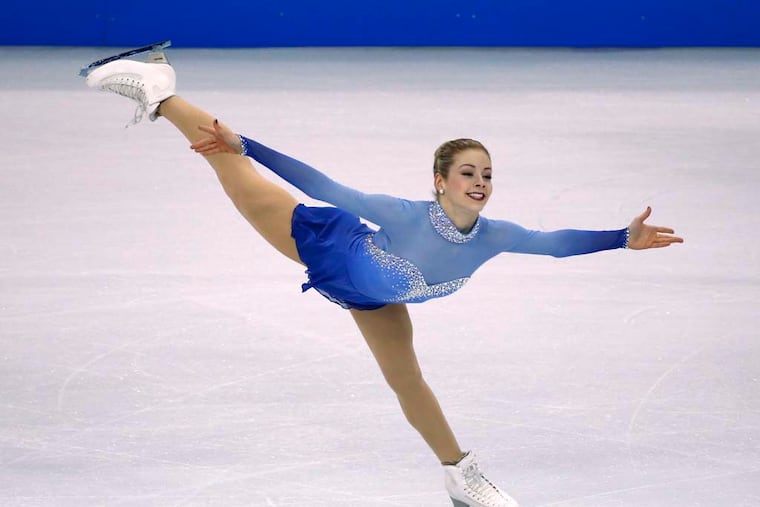Gracie Gold looks to return to the U.S. figure skating spotlight on her own terms
Gold, 26, who has spent the past few years training at IceWorks in Aston, Pa., about 30 miles outside Philadelphia, missed a spot on this year's Olympic team.

Gracie Gold isn’t exactly sure when she said it. But she regrets that she did. The quote follows her around like a bad friend, a reminder of the disordered eating and depression that drove the Olympic figure skater to consider taking her own life, she said.
“Always wear a smile,” Gold said in early January, reciting the quote in a mocking tone, “because you never know who is watching.
“I hate that quote.”
Get bonus offers from the best PA sports betting sites
These days, Gold smiles only when she wants to. In November 2018, when Gold began her comeback tour after a 17-month hiatus from the sport, she made a decision: She would skate not for the judges, or her coaches, or even her country. Gold would skate – she would jump; she would spin; she would soar – for herself.
Gold, 26, who has spent the last few years training at IceWorks in Aston, Pa., about 30 miles outside Philadelphia, qualified for the U.S. Figure Skating Championships in 2020 and 2021. But it was at this January’s national championships, with a Beijing 2022 Olympics bid on the line, that Gold shone brightest, earning a 67.61 score from the judges to finish in sixth place out of 16.
» READ MORE: South Jersey figure skater is on the rise, but her Olympic dreams are on hold
A sloppy free skate the following night dashed her Olympic dreams but hardly dampened the moment.
“Her comeback has been on her terms,” said her twin sister, Carly. “To see it all pay off with this incredible skate, I still get goosebumps thinking about that moment.”
Gold started skating at age 8 and envisioned greatness. She imagined the headlines – “Gold wins gold” – and put in the work, often remaining on the ice long after practice in hopes of nailing one last jump, to the sound of honks from the irritated Zamboni driver.
Gold, indeed, helped Team USA win gold at the 2013 and 2015 World Team Trophy events, then took fourth in the ladies’ singles event at the 2014 Sochi Olympics as Team USA won bronze. She was hailed as the sport’s next big thing.
But in private, Gold was hurting. After being shamed by a coach for putting on weight, she found that the less she ate, and the lighter she became, the better she performed, she said. And as her star soared, Gold’s self-esteem plummeted.
Carly, who also grew up a competitive skater, said her sister became difficult to connect with after Carly retired from the sport following the 2016 national championships. Gold was living alone in a Detroit apartment, preparing for the Pyeongchang 2018 Olympics, floundering amid the pressures of being an elite female figure skater in the United States.
“I was pretty much detached from skating, and that was still her whole life,” said Carly, who had enrolled at Marymount California University. “[She was] very withdrawn. She went to the rink. She did her training. She went to her room. Not happy.
“I didn’t know how bad things were.”
Things were so bad in 2017 that Gold said that she contemplated the point of living into 2018. For years she had been spinning in a dangerous cycle, hardly eating and consuming laxatives and coffee. Then she would binge-eat. Also, her father, Carl, had his medical license suspended in February 2017 after the anesthesiologist was reportedly found to have taken hospital drugs for personal use, according to a 2019 People Magazine article.
At a camp in Colorado Springs in 2017, Gold was persuaded by a team doctor and team trainer to seek help, and she enrolled at the Meadows, a residential treatment center in Wickenburg, Ariz., she said, for anxiety, depression, and disordered eating.
Forty-five days later, Gold emerged with a new perspective. She discovered who she was outside of skating. She developed hobbies – painting, crafting, building furniture, Carly said. When Carly graduated from college in December 2020, Gold made her a purple, green and white swirled banner using an electronic cutting machine. She adopted a cat, Teddy, and knit him a sweater.
And when Gracie returned to the ice, new coaches Alex Zahradnicek and Pasha Filchenkov emphasized the importance of skating for the right reasons.
“You don’t need to do anything for anybody,” Zahradnicek said he told Gold.
» READ MORE: Adam Rippon adds to his Olympic legacy by helping coach U.S. champion Mariah Bell
The culmination of that journey came shortly before 9 p.m. Jan. 6, when Gold skated to center ice at Bridgestone Arena.
Carly and their mother, Denise, were in attendance after tip-toeing two miles of icy sidewalks. As “East of Eden” – a tribute to her idol Michelle Kwan, and a song coaches had never permitted her to use – blared through the arena, Gold delivered a clean short program, nailing a triple loop, a double axel, and a triple lutz-triple toe combo. The music stopped, the fans applauded, and Gold covered her face with her hands, before dropping them to her hips. She was smiling, and she did not care who was watching.